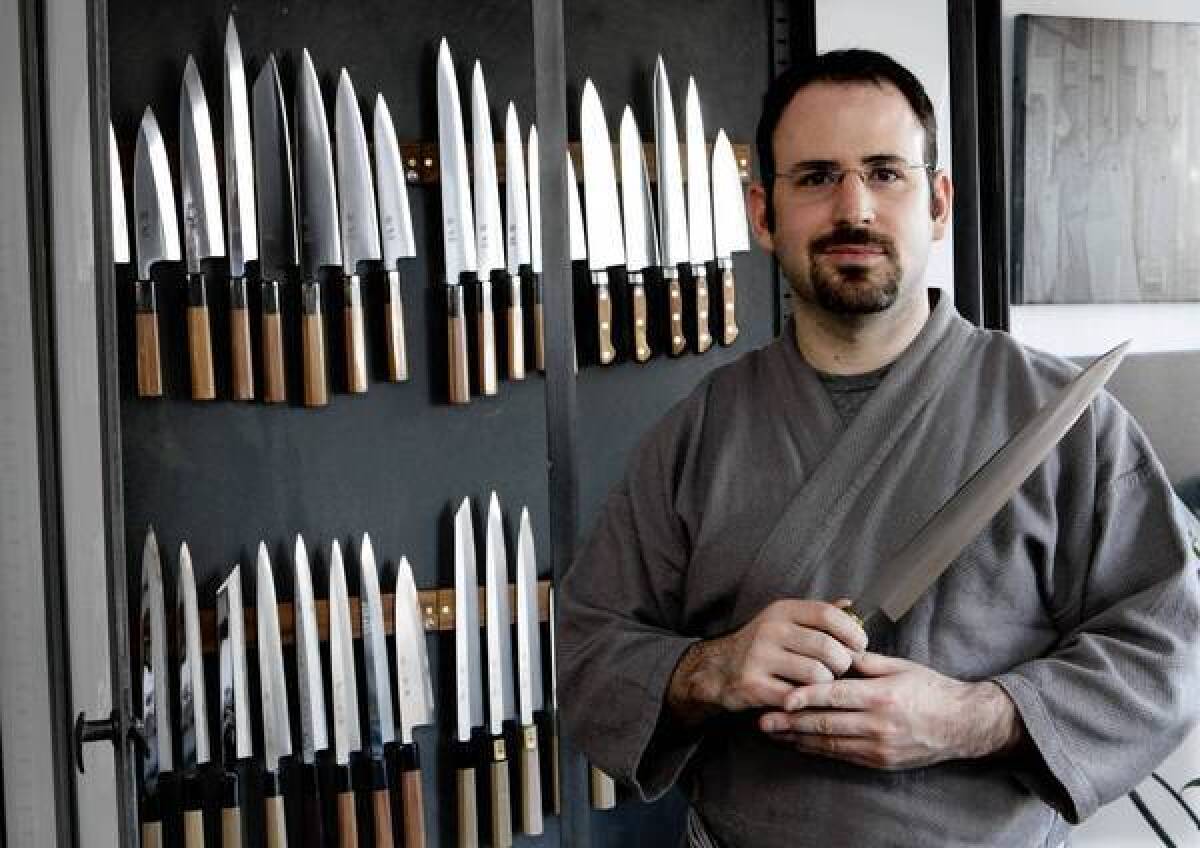Across the Table: Knife expert hopes to sharpen up chefs

- Share via
Though the address reads Main Street, the specialist shop Japanese Knife Imports in Venice is a bit hidden away, down a few steps from the parking lot of a nondescript multi-unit building, indicated only by No. 105. “I kind of like it like that,” proprietor Jonathan Broida explains. “In order to find me, people have already made some effort to do the research. And I end up with the kind of customer that I want.”
Walk into his shop as a novice and he won’t just sell you a knife. He’ll want to sit down at the low table in the center of the room, preferably over genmaicha tea served in a lovely ceramic tea bowl, made by his wife Sara’s family in northern Japan, and explore your relationship to knives. Call him a knife shrink. What sorts of things do you like to cook? How are your knife skills? What kinds of things do you cut? What sort of cutting board do you have? What other knives do you own? How comfortable are you with sharpening your own knife?
Broida has a big following among knife geeks. That includes a number of local chefs (from Spago, Providence, Rustic Canyon, Ink and many more) who are into craftsmanship and sharp blades.
He used to cook professionally and understands what they need in terms of tools. And he exults in sharing his considerable knowledge — the difference between single- and double-beveled, how the blades are forged and shaped, and the virtues of each kind of steel — carbon, stainless, semi-stainless and everything in between — employed in their making.
Broida opened the shop almost two years ago. With a degree in Asian studies, he had started cooking for a living, and at one point went to work in Japan. There, he asked his chef to show him how to sharpen his knife. Big mistake. Soon he was expected to sharpen everybody’s knives, he says with a laugh. But he learned, and he got better at it.
Every chef he met had a different technique. But they were still chefs who sharpened knives, he explains, not professional knife sharpeners. And there’s a big difference. As he got more interested, he sought out craftsmen who could show him more. During that process he found father-son professional sharpeners who were the best he’d ever seen. And he still goes back every year to work with them.
Along the walls of the shop, three tall raw-steel cases hold the dozens of knives for sale, 80% of them custom-made for Broida. Sideboards display rustic pottery from Sara’s family and other ceramicists. I spot sacks of binchotan (Japanese hardwood charcoal). A copy of the latest Lucky Peach magazine as well as Michelin three-star French chef Michel Bras’ reissued book “Essential Cuisine” are also there, just waiting for someone to leaf through them.
Chefs drop in to have a knife sharpened or repaired, or just to hang out, maybe check the informal job list Broida has posted. “I’m trying to create a community of knife geeks,” says Broida.
You don’t need dozens of knives, he’ll tell you, at the same time confessing that he’s kept every knife he’s ever owned as he moved up the skill ladder in kitchens. “I’m a pack rat. I keep everything for its sentimental value.”
But a knife is just a tool. The most important thing, he says, is knowing how to sharpen. He can do it for you, but it’s better if you learn yourself. “There’s always a level of disconnect with your tools if you don’t sharpen your own, and that bothers me.”
When he sharpens for you, each knife is worked by hand using Japanese water stones. For double-bevel knives, the cost is $15. Single-bevel knives are $15 to $25, depending on size. He’ll also repair chips, broken tips, refinish surfaces and more, and can replace or upgrade handles on both Western and Japanese knives.
To help with that, Broida has posted a series of online knife sharpening and technique seminars on YouTube (Japanese Knife Imports has its own channel there). He will also do one-on-one sharpening classes at the shop for a fee and swears he can teach almost anyone to be reasonably competent in two to four hours (two-hour one-on-one sharpening classes are $150).
The most important thing is not to be afraid of using your knife. “Unless your knife is broken in two or bent at a severe angle, I can fix almost anything,” he says reassuringly, even a little gleefully. “Go for it — within the scope of common sense.”
Japanese Knife Imports, 1501 Main St., No. 105, Venice, (310) 399-0300, https://www.JapaneseKnifeImports.com. Open 11 a.m. to 6 p.m. Mondays to Wednesdays and Fridays, and noon to 5 p.m. Saturdays and Sundays. Closed Thursdays and major holidays.
More to Read
Eat your way across L.A.
Get our weekly Tasting Notes newsletter for reviews, news and more.
You may occasionally receive promotional content from the Los Angeles Times.










